News Based on facts, either observed and verified directly by the reporter, or reported and verified from knowledgeable sources.
Extraction and resistance at Thacker Pass
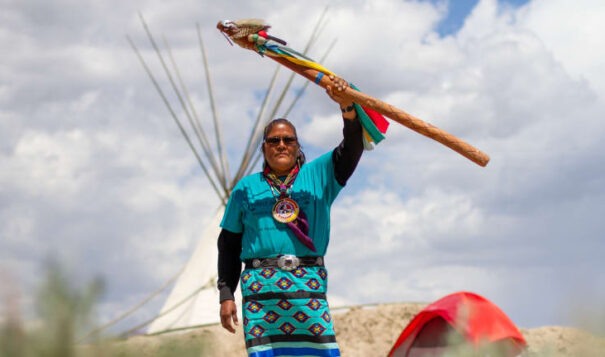 Dorece Sam Antonio holds her eagle staff on May 17, 2023 at Newe Momokonee Nokotun or Ox Sam Camp in Thacker Pass. Photo by Jarrette Werk (Underscore News / Report for America)
Dorece Sam Antonio holds her eagle staff on May 17, 2023 at Newe Momokonee Nokotun or Ox Sam Camp in Thacker Pass. Photo by Jarrette Werk (Underscore News / Report for America)
Police and private security for a Canadian mining company arrested an Indigenous protester and demolished a protest blockade on Wednesday that was erected by descendants of a survivor of the 1865 massacre at the site, according to land and water defenders
In May, elders from Nuwu, or the Fort McDermitt Paiute-Shoshone Tribe, gathered with land defenders and water protectors to expand their protest camp and block construction of the Thacker Pass Lithium Mine in northern Nevada. Together, the group built a second ceremonial tipi directly in the path of a water pipeline the mining company is building as an initial phase of its planned open pit mine.
Lithium Americas plans to extract the largest known lithium deposit in the United States, while also, critics say, destroying the home of animals like the sage grouse and golden eagle, plant medicines like ibi and toza root and the final resting place of over 30 men, women and children who were killed by the 1st Nevada Cavalry on Sept. 12, 1865.
On a golden morning last month, the sun was just peeking over the snowcapped mountains as Fort McDermitt Paiute-Shoshone tribal elders Josephine Sam Dick, 76, and her sister, Elvida Sam Crutcher, 73, led the creation of Newe Momokonee Nokotun, a Paiute name that translates to Indigenous Women’s Camp.
Some call the resistance camp by its other name: Ox Sam Camp, after the sisters’ great-grandfather, who was one of only three survivors of the 1865 Thacker Pass Massacre.
That history was front and center in the minds of many there on Wednesday.
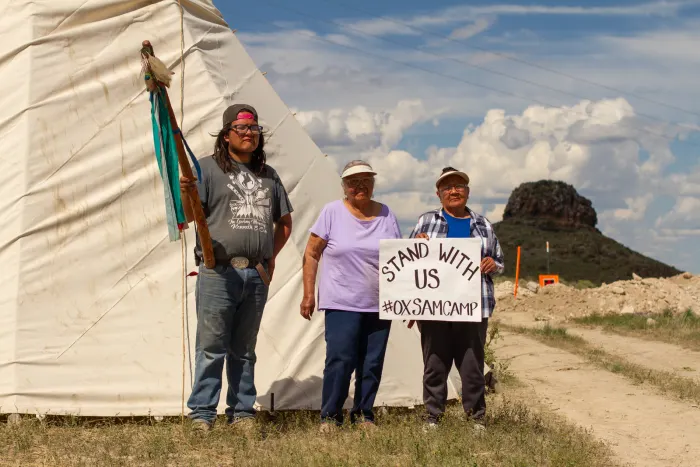
Authorities raid camp, arrest one person
On Wednesday, police from the Humboldt County Sheriff’s Office and private security for Lithium Nevada, a subsidiary of Lithium Americas, cleared the camp and arrested one protester, a Diné woman who was later released on bail, according to four water and land defenders who were there.
Michon Eben, cultural resource manager and tribal historic preservation officer for the Reno Sparks Indian Colony, told Underscore News that police and private security leveled the camp and took sacred objects, including a ceremonial hand drum, eagle feathers and a carved staff.
“They desecrated ceremonial objects,” Eben said. “All things have been confiscated by Humboldt County Sheriff and Lithium Nevada, ceremonial objects. They put the sacred fire out and they tore the tipis down.”
In a press release, protesters added that authorities snapped their tipi poles, which belonged to the uncle of Dorece Sam Antonio, a member of the Fort McDermitt Paiute-Shoshone Tribe.
“The desecration that Humboldt County Sheriffs and Lithium Nevada conducted by knocking the tipis down and rummaging through sacred objects is equivalent to destroying a bible, breaking the cross, knocking down a cathedral, disrespecting the sacrament and denying deacons and pastors access to their places of worship,” Josephine Sam Dick, the Fort McDermitt Paiute-Shoshone tribal elder, said in a statement.
Captain Sean Wilkin at the Humboldt County Sheriff’s Office denied any involvement with those actions. He said his officers responded when Lithium Nevada complained that protesters were approaching workers in their excavators. He said the sheriff’s office removed nothing except a vehicle with expired tags and a trailer that was blocking the road.
“The tipi is still standing, all of the tents are still in place, all of the garbage is still there,” Captain Wilkin said Thursday. “We did not damage anything. We did not take anything down. We did not extinguish the fire. We didn’t do any of that.”
He added that he spoke with the security director employed by Lithium Nevada Thursday morning, and said that person told him a tribe from Fallon will arrive Friday to remove the tipi.
“According to them this morning, it is all still standing exactly as it was left and they made the proper arrangements with the Native American group out of Fallon.”
Lithium Nevada did not return phone calls or emails requesting comment about the raid or its security practices.
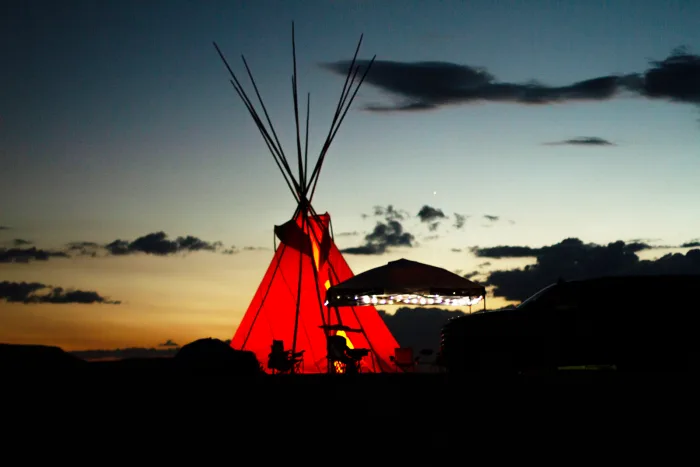
The incident began Wednesday morning, when a worker tried to drive an excavator past the camp blockade, which sits above the surrounding valley, near the rocky feature known in Paiute as Peez’uh. Because of its high elevation, Paiute people once used Peez’uh, also known as Nipple Rock or Sentinel Butte, as a lookout point to spot cavalry. Elders say golden eagles bathe at the summit.
Land and water protectors convened and decided to put their bodies in front of the heavy equipment. Then, they said, the man driving the excavator swung the bucket at them, narrowly missing one protester. Another worker approached and told the worker driving the excavator to retreat back down the hill and away from the camp.
Protesters said they began to follow the workers down the hill. Then they spotted a caravan of cops. A half dozen police cars and SUVs pulled up the gravel road to the main camp. Police arrived and began to demand that each protester identify themselves. One person there, a member of the Navajo Nation who wishes to remain anonymous, told police her name was Ox Sam.
“That’s who we’re representing out here,” she told Underscore News in a phone interview on Wednesday night. “The survivor that ran off at the 1865 massacre.”
She said police put her in an unmarked, blacked-out vehicle that was pitch dark inside. She was charged with trespassing and resisting arrest and later released on bail.
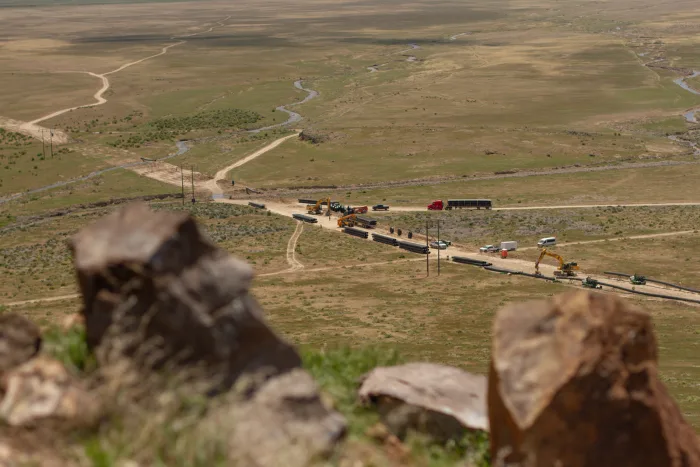
The other land and water defenders split up and retreated into the hills, following the same path Ox Sam took when he fled the 1865 Thacker Pass Massacre. They reconvened at the sacred site at Nipple Rock, according to a land and water defender from the Blackfeet Nation who identified himself only as Coup.
“We heard the cops and the security below us, and it was very much like a search party hunting us down,” he said.
After hours of laying low they eventually made it out. Several people who were there said the incident won’t stop them from protecting the land and water at Thacker Pass.
“What’s happening at Ox Sam is a reflection of what’s to come in this new shift of industry,” Coup said. “And we just hope that what happens here can serve as a reminder as to what is still happening, which is colonization.”
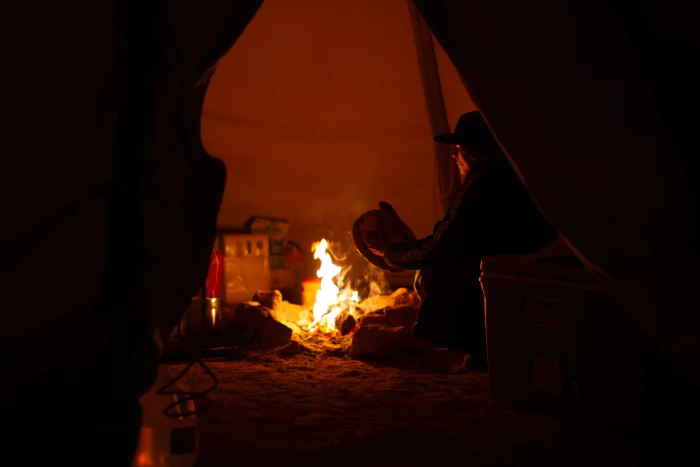
Lithium Americas, the Canadian-based company overseeing the project, is moving quickly to build the largest lithium mine in the nation and the biggest open pit lithium mine in the world. The deposit sits within an extinct supervolcano — the McDermitt Caldera, which is about 50 miles east of the Fort McDermitt Reservation.
The Bureau of Land Management approved the $2.2 billion mine project in January 2021, just five days before the end of the Trump administration, despite opposition from tribes, ranchers and environmentalists. If completed, the water pipeline will pump 1.7 billion gallons of water out of a sensitive desert aquifer each year. The open pit mine itself would cover 28 square miles and dig 400 feet into the earth.
“I don’t like the idea of what [Lithium Americas] is doing to the ground, scarring it up, I don’t like that,” said Elvida Sam Crutcher. “They’re going to ruin the water, the air that is going to be blowing toward our reservation, it’s going to be killing us. We don’t want that, we got a lot of grandkids. We are grandmas, great-grandmas, that’s how we are. We care for our Mother Earth. We’re praying people.”
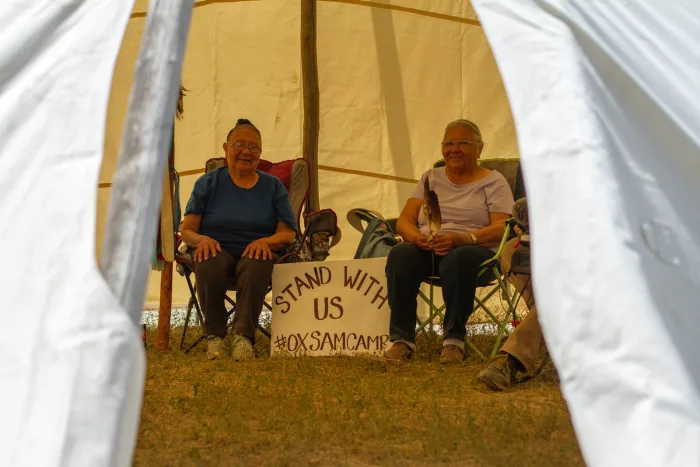
Protecting a massacre site
Nearly 160 years ago, the 1st Nevada Cavalry attacked a Paiute camp at daybreak, near the present-day Nevada and Oregon border. Firsthand accounts say soldiers killed dozens of men, women and children as they slept.
Ox Sam was one of just three to survive the massacre. The young man sliced open the wall of his wickiup, jumped on his horse and fled, leaving his murdered loved ones behind.
Today, four generations of Ox Sam’s descendants are fighting to help preserve the burial grounds of their ancestors, protect the sacred sites and save the water for future generations.
The Fort McDermitt Paiute-Shoshone Tribal Council, leaders of the tribal nation where Ox Sam’s descendants are members, supports the project. Representatives for the tribe did not respond to requests for an interview before publication.
But several tribes, including the Reno-Sparks Indian Colony and the Winnemucca Indian Colony in Nevada, have gone to court in an effort to pause any excavation and construction at Thacker Pass by Canadian-based Lithium Americas.
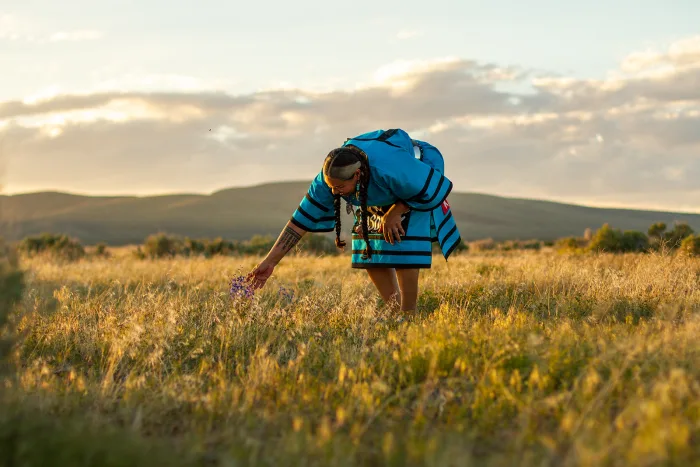
In 2021, U.S. District Judge Miranda Du ruled against the tribes, stating there is no evidence of massacre at the proposed mine site, and gave the green light for construction.
But several accounts recorded the massacre at the time, including local newspaper The Humboldt Register and a book by labor organizer Bill Haywood recording Ox Sam himself describing his ordeal.
And the government’s own surveyor found “many Indian skulls and other remains … scattered over this portion of the township.” Writing in his journal three years after the massacre, U.S. Deputy Surveyor Abed Alley Palmer kept notes of his survey of the same camp where Ox Sam’s family was killed.
“I found the remains of an extensive Indian Camp,” Palmer wrote.
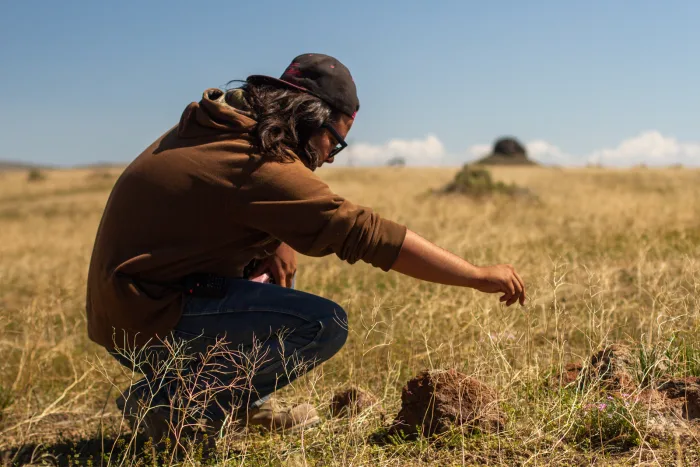
The federal government is required to engage in a formal, two-way, government-to-government consultation with tribal officials before approving projects with significant effects on tribes. That didn’t happen, according to Eben, the cultural resource manager and tribal historic preservation officer for the Reno Sparks Indian Colony.
“Sending a letter is not meaningful consultation,” Eben wrote in a letter to the Bureau of Land Management in June 2021. “Discussing the project with unspecified tribal members over two-and-a-half years ago when you knew LNC’s plans for the Project had changed significantly over those two-and-a-half years is not meaningful consultation. Reading academic literature is not meaningful consultation. And, consulting about a different project, with totally different extractive processes seven years ago, is not meaningful consultation.”
Representatives of the Bureau of Land Management declined to provide a statement. Judges for the U.S. Court of Appeals for the Ninth Circuit will hold another hearing later this month in Pasadena, California.
“This is an example of, truly, modern day racism,” said Will Falk, attorney for the Reno Sparks Indian Colony. “If they find lithium under the Arlington National Cemetery, where thousands of primarily white soldiers have been buried, they’re not going to disturb that. I think this is cultural oppression in 2023; that’s what racism looks like today.”
Resisting ‘the new cavalry’
Back in May, Dorece Sam Antonio, a Fort McDermitt Paiute mother and grandmother, and another direct descendant of Ox Sam, proudly wore her ribbon skirt and held her staff as she stood in front of semi-trucks hauling construction equipment.
She refused to move, one of about two dozen land and water defenders who stood quietly, holding a banner demanding an end to construction of the mine.
“I made the commitment to be here because of my descendants, to fight for them to be here for them,” Sam Antonio said.
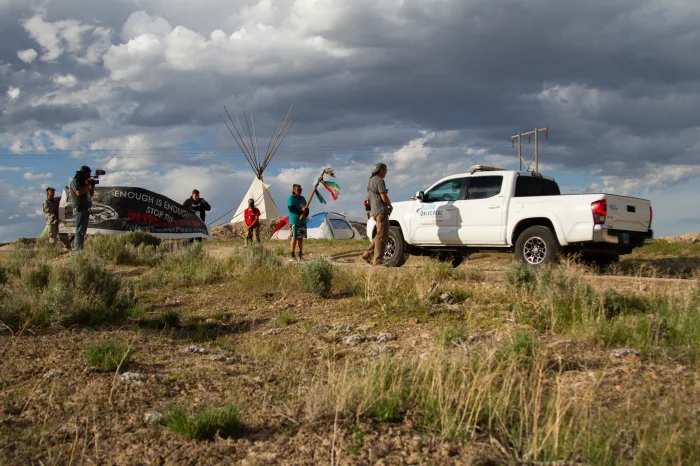
Sam Antonio serves as a tribal monitor and translator for the elders.
“I choose to stand out here and fight against this desecration of our ancestral burial grounds,” she said. “I’m not going to see the effects of what’s to come. The elders aren’t going to see the effects of it. My children might, but their children will. And that’s why I choose to stand out here. So those generations can have clean air and clean water to drink and Mother Earth to walk on.”
This fight is all too familiar to Indigenous peoples, according to Eben.
Eben says the government has been removing Indigenous peoples from resource-rich lands since settlers first stepped foot on the soil of this continent. It’s a bloody strategy that Paiute people know firsthand.
Thacker Pass is the site of two recorded massacre sites, the first being the Thacker Pass Massacre of 1865, which Paiute speakers call Peehee Mu’huh, or Rotten Moon. The second is the Snake War, known to the Paiute, Bannock and Western Shoshone who lived along the Snake River as a war of genocide in which 60% of all Paiute people were killed.
“Between 1864 and 1868, they had a campaign to massacre us,” Eben said. “Then seven years later they [passed] the General Mining Act of 1872. It’s horrifying.”
The General Mining Act of 1872 declared all valuable mineral deposits in land belonging to the United States to be free and open to exploration and purchase. This law provides U.S. citizens the opportunity to explore, discover and purchase certain valuable mineral deposits on federal lands that are open for mining.
While more and more settlers and miners flocked to Nevada to stake their claims to land and precious resources, five decades would pass before Native American people would be granted United States citizenship. In the meantime, among other things, Paiute people removed from their ancestral homelands in the years before the passage of the General Mining Act couldn’t legally mine under the law.
Eben said today’s lithium mine is a repetition of that history.
“The Bureau of Land Management and Lithium Nevada, they’re the new cavalry,” Eben said.
‘We survived centuries of extraction’
In May, Elders watched closely and taught young men how to build the tipi, which was used for prayer and ceremony. Obsidian glittered as lizards scurried among the sagebrush. Careful hands placed each weathered pole, while the songs of the Western meadowlark echoed across the valley. One elder cracked jokes in Paiute and they all burst into laughter.
This is what Thacker Pass sounded like before the arrival of Lithium Nevada.
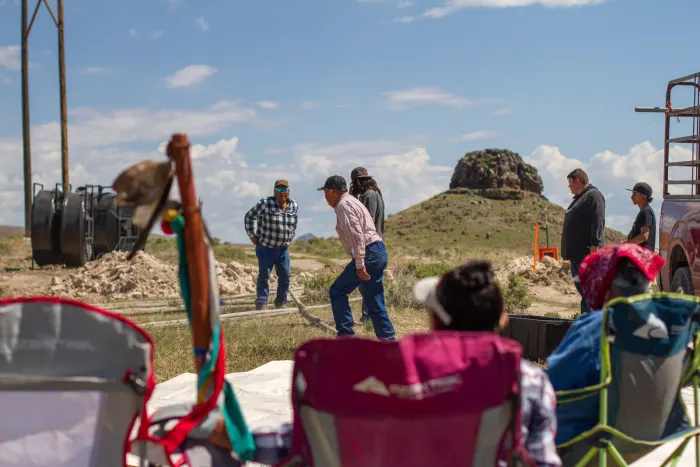
Instead, the hum of diesel engines, the scraping of excavators and the beeping of heavy machinery could be heard for miles. Even so, the sounds of birds and laughter of the Paiute-Shoshone people remain.
Down the hill, semi-trucks hauled stacks of large black pipes down gravel roads, leaving behind dust trails that floated across the desert and served as distant indicators of continued construction.
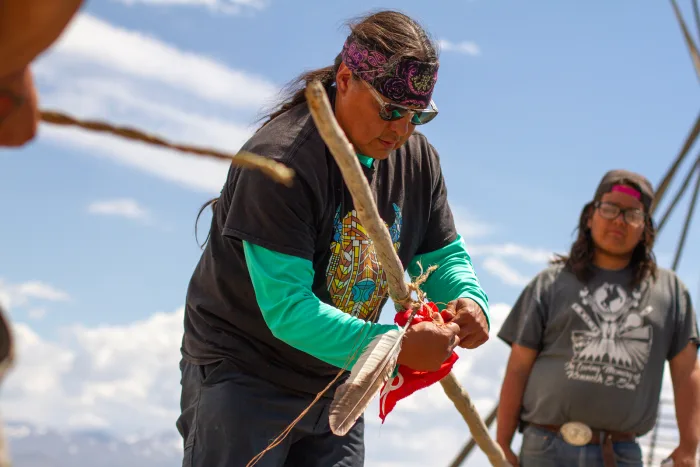
The ceremonial tipis at Ox Sam camp are meant to show President Joe Biden, Secretary of Interior Deb Haaland and the world that the government is ignoring sacred sites and massacre sites, according to Chase Iron Eyes, attorney and Oglala Lakota citizen.
“We Indigenous Nations and Indigenous peoples have survived a lot,” Iron Eyes said. “We survived centuries of extraction.”
Underscore is a nonprofit collaborative reporting team in Portland focused on investigative reporting and Indian Country coverage. We are supported by foundations, corporate sponsors and donor contributions. Follow Underscore on Facebook and Twitter.
